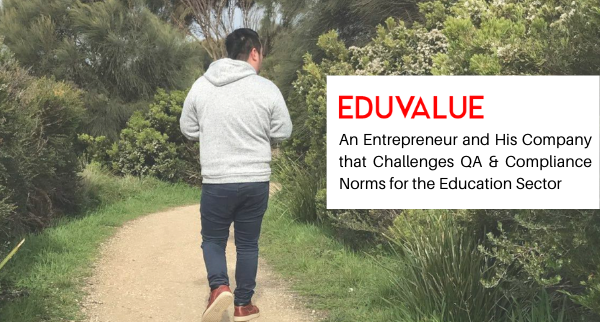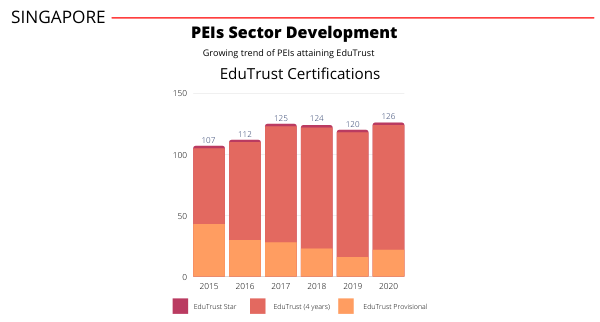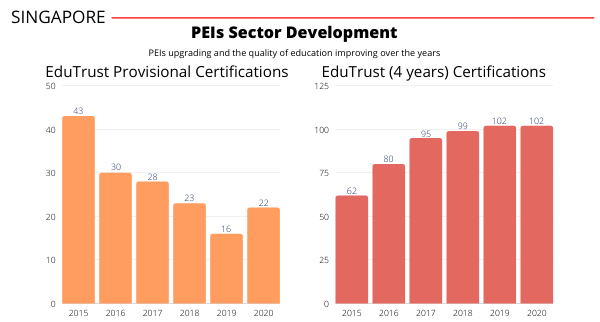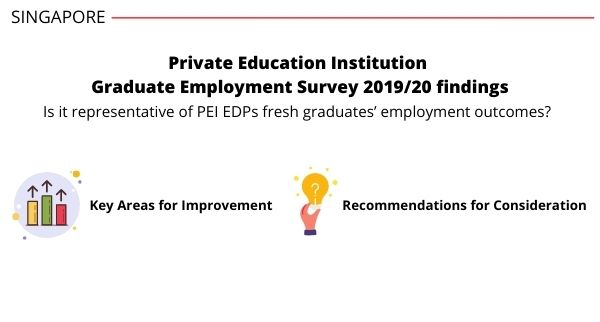EduValue Singapore (EV) was founded in 2012 by Barry Aw Yong. EV has since become the leader in ERF, EduTrust Consulting and Quality Assurance (QA) Frameworks for Private Education Institutions (PEIs) that are regulated by the Committee for Private Education (CPE) in Singapore. EV also does set-up and consulting work for Kindergarten, Enrichment & Tuition sectors, and Workforce Skills Qualifications (WSQ) Training Providers/ Approved Training Organisations (ATOs) sectors, forming an in-depth footprint into Singapore’s education landscape.
I managed to catch up and chat with Barry to learn more about his background, the inspiration for EV, and how the company endeavours to support and enhance the Private Education Sector in Singapore and abroad.
Q: What did you do before becoming an entrepreneur?
As a fresh graduate, I was an employee doing QA and compliance in the QA department of a private school. I was hungry to learn all I could about QA and EduTrust requirements. It was then I started to realise that QA was done in a very traditional and inefficient manner. After a few months, I noticed the opportunities in growing in my role so I studied, internalised, memorised and was familiar with the ERF and EduTrust regulations.
Q: When did you realise that you wanted to start your own company?
While employed at the private school, I had learnt everything I could about QA and compliance regulations and grew bored. I went for an interview with another big school for a QA position as I thought doing EduTrust for a bigger school would be better. I was rejected from this position as they mentioned that I was inexperienced and the internal audit reports I shared was one-tenth the length of their reports. I was young and determined to prove people wrong and so I wrote a book for my current employer titled, Internal Process Review, Audit and Assessment. The book included a holistic analysis of the school’s systems and focused on integrating the key components of QA and compliance with real-time and on-the-ground operations.
When the book was completed, I presented it to the CEO of the private school who was surprised that a fresh graduate could produce such work. It was at this moment where I knew I wanted to start a company in QA and compliance.
Q: How did you start EV?
The book that I wrote and its integration of QA, compliance and operations was the inspiration for and formed the key foundation for my vision of EV. My experience and understanding of a QA department on-the-ground of an established school gave me a hunch that if the QA management and department of a school of such calibre can be improved with understanding of how QA and operations can be integrated and made more efficient, there were probably many other schools that were in similar situations. They would be EV’s ideal clients.
I submitted a proposal to Temasek Polytechnic’s (TP) ACE Start Up Grant that had funding from Spring Singapore to fund start-ups by entrepreneurs below 26-years-old. I got into the programme and had a mentor who was experienced and understood QA and consulting. He knew it was an old and traditional function that is typically implemented and done by mature professionals – people with 20-30 years of experience in the field. He told me in a matter-of-fact manner that I was young, my business was non-existent in Singapore, and it would be hard to grow and scale as people would not pay for the services and the profit and loss projections were too idealistic. He challenged me to prove the viability of his business idea and come back with one or two deals. If I could do that, he would fund me immediately.
I took leave and got to work. I was rejected by the first school I approached because the school’s interests did not align with my offerings as it was not EduTrust certified. I tried again and met with the director of another school who was willing to make a deal. The second school I approached was 1-year EduTrust certified and they immediately signed a deal. This gave me the confidence to return to my current employer and to hand in my resignation. While he was shocked at my resignation, he wanted to know what was next for me. I shared about my passion to start EV to do EduTrust consulting. After hearing my plans, my employer gave me a 5-year contract worth 6 figures. By November 2012, I had two deals in my pocket so I went back to TP and received funding from my mentor. On 30 November 2012 I resigned and I scrambled to start my company and journey as a young entrepreneur on 1 December.
Q: What were some challenges you faced as a young entrepreneur? Were there any challenges and difficulties that you faced along the way?
As a young entrepreneur, I was inexperienced in running a business and trying to make EV an innovative and forward-looking company in an old and traditional QA and consulting industry added to the challenge.
As EV was a start-up, I had to make a lot of cold calls to schools to inform them about our services. I knew that the market for our services were there, they just needed to be educated about it. I am thankful to my ex-employer for being one of my first clients because by having them as a client, they gave EV the credibility it needed to convince potential clients to come on board.
The toughest challenge I faced was that I was alone and had to do everything myself. This is unlike other start-ups that have a few co-founders to share the workload. Although I had a part-time employee doing some backend paperwork, I found myself doing everything else from the writing of operations, manuals and policies for clients, issuing invoices, managing staff payroll and CPF, product development and sales. I would often find myself working on deliverables until 2-3am in the morning to make deadlines for my paying clients.
Q: What are some of EV’s key milestones that you are proud of?
The first key milestone was EV surviving and being profitable in the first year. EV was profitable with $77k even after paying myself a salary. This came as a surprise to my mentors from TP’s ACE Start Up Grant as most start-ups do not have such tractions especially in the first year.
The second key milestone was growing the company by employing full time staff. This allowed me to delegate EV’s workload and focus more on developing our products which was important to me. This was the best decision I made because it helped the company grow. In the next 2 years, I hired 4 more employees, including my sister who was still studying her bachelor degree at NUS at the time.
The third key milestone would be how my sister helped a client upgrade from a 1-year to 4-year EduTrust. I still remember how she had gone down for the site assessment right after her exam to conclude the audit. This was a turning point for EV because this achievement was a catalyst for EV’s growth. While we still made cold calls, we started to have some referrals and started our marketing initiatives including setting up the company website and using Google ads as well as hired more employees.
Q: How has EV evolved over the years?
Over the past 6 years, we have developed new brands like iCosys, Bay Alliance, The EV Network and EV Academy that enhance EV’s endeavours in supporting the private education sector. For example, iCosys is the digital supporting brand of EV specialising in customising digital infrastructure to support each school’s needs whether it is in school systems like School Management System (SMS), Learning Management System (LMS), Workspaces or Digital Certs.
In 2020, EV underwent a major restructuring to establish all our companies under EV Education Group to work towards a common vision of transforming schools into world-class establishments.
Q: How does EV add value to the Private Education Sector in Singapore and Asia?
In Singapore, EV strives to help small and established schools realise that they cannot put the school’s licensing responsibility on one or a few employees. Instead, having a professional firm like EV take on the responsibility would give them a lot of benefits such as
• Being relevant and up-to-date with the EduTrust process as we do more than 30 EduTrust renewals a year. This is compared to a school’s employee who may tackle about 5 EduTrust license renewals over a career of 20 years.
• The subject on independency allows us to resolve issues before it goes out of control. This is compared to internal QA employees who may not inform their employers of any issues.
• No turnover worries or issues that would affect the school’s ability to meet the license requirements.
Over the years, EV’s trajectory has become more macro where we start looking towards tackling industry-level issues. We have poured resources into researching products and how schools can be improved, as well as maintaining licensing which is our core business. Our supporting brands like Bay Alliance and iCosys have been active in this area.
EV has worked with Bay Alliance to assist companies, international and global funds and groups, in M&A and turnkey projects. Our value goes beyond Singapore’s shores and we are working on specialising in this sector and understanding the international space.
iCosys has been researching and have built Digital Certs with blockchain technology as the backbone. This was an endeavour years in the making as I didn’t want this to be a money-making tool but a tool that would contribute to the industry and attempt to alleviate the problem of fake certificates. I hope that this would help to protect Singapore’s brand as a quality education hub. iCosys did not launch digital certs until we were certain it was ready to benefit the whole industry. This showcases our commitment to enhance the industry.
The EV Education Group hopes to work together and tap on each brand’s strengths to bring the private education sector to greater heights.
Written and graphic design by Gillian Koh, Industry Research Team at EduValue





